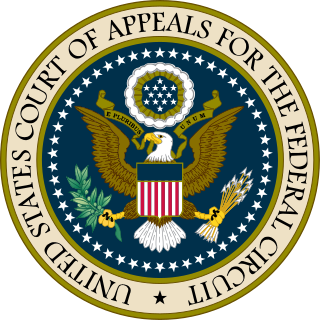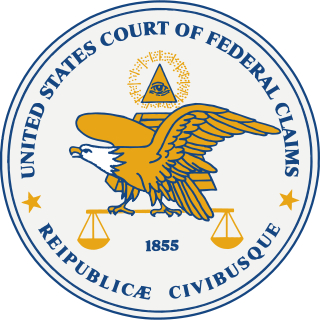Related Research Articles
In the United States, a state court has jurisdiction over disputes with some connection to a U.S. state. State courts handle the vast majority of civil and criminal cases in the United States; the United States federal courts are far smaller in terms of both personnel and caseload, and handle different types of cases.

The United States courts of appeals are the intermediate appellate courts of the United States federal judiciary. The courts of appeals are divided into 11 numbered circuits that cover geographic areas of the United States and hear appeals from the U.S. district courts within their borders, the District of Columbia Circuit, which covers only Washington, D.C., and the Federal Circuit, which hears appeals from federal courts across the United States in cases involving certain specialized areas of law. The courts of appeals also hear appeals from some administrative agency decisions and rulemaking, with by far the largest share of these cases heard by the D.C. Circuit. Appeals from decisions of the courts of appeals can be taken to the U.S. Supreme Court.

The United States district courts are the trial courts of the U.S. federal judiciary. There is one district court for each federal judicial district, which each cover one U.S. state or, in some cases, a portion of a state. Each district court has at least one courthouse, and many districts have more than one. District courts' decisions are appealed to the U.S. court of appeals for the circuit in which they reside, except for certain specialized cases that are appealed to the U.S. Court of Appeals for the Federal Circuit or directly to the U.S. Supreme Court.

The federal government of the United States is the national government of the United States, a federal republic located primarily in North America, composed of 50 states, a city within a federal district, five major self-governing territories and several island possessions. The federal government, sometimes simply referred to as Washington, is composed of three distinct branches: legislative, executive, and judicial, whose powers are vested by the U.S. Constitution in the Congress, the president and the federal courts, respectively. The powers and duties of these branches are further defined by acts of Congress, including the creation of executive departments and courts inferior to the Supreme Court.
The court system of Canada forms the country's judiciary, formally known as "The King on the Bench", which interprets the law and is made up of many courts differing in levels of legal superiority and separated by jurisdiction. Some of the courts are federal in nature, while others are provincial or territorial.

The United States Court of Appeals for the Federal Circuit is a United States court of appeals that has special appellate jurisdiction over certain types of specialized cases in the U.S. federal court system. It has exclusive appellate jurisdiction over all U.S. federal cases involving patents, trademarks, government contracts, veterans' benefits, public safety officers' benefits, federal employees' benefits, and various other categories. Unlike other federal courts, the Federal Circuit has no jurisdiction over cases involving criminal, bankruptcy, immigration, or U.S. state law.

The United States Court of International Trade is a U.S. federal court that adjudicates civil actions arising out of U.S. customs and international trade laws. Seated in New York City, it exercises broad jurisdiction over most trade-related matters, and is permitted to hear and decide cases anywhere in the country, as well as abroad.
An administrative law judge (ALJ) in the United States is a judge and trier of fact who both presides over trials and adjudicates claims or disputes involving administrative law. ALJs can administer oaths, take testimony, rule on questions of evidence, and make factual and legal determinations.
The federal judiciary of the United States is one of the three branches of the federal government of the United States organized under the United States Constitution and laws of the federal government. The U.S. federal judiciary consists primarily of the U.S. Supreme Court, the U.S. Courts of Appeals, and the U.S. District Courts. It also includes a variety of other lesser federal tribunals.

The United States Tax Court is a federal trial court of record established by Congress under Article I of the U.S. Constitution, section 8 of which provides that the Congress has the power to "constitute Tribunals inferior to the supreme Court". The Tax Court specializes in adjudicating disputes over federal income tax, generally prior to the time at which formal tax assessments are made by the Internal Revenue Service.

The United States Court of Federal Claims is a United States federal court that hears monetary claims against the U.S. government. It was established by statute in 1982 as the United States Claims Court, and took its current name in 1992. The court is the successor to trial division of the United States Court of Claims, which was established in 1855.
Title 28 is the portion of the United States Code that governs the federal judicial system.
The United States Court of Customs and Patent Appeals (CCPA) was a United States federal court which existed from 1909 to 1982 and had jurisdiction over certain types of civil disputes.
The Civilian Board of Contract Appeals (CBCA) is an Article I court that was established under the Contract Disputes Act of 1978 as an independent tribunal to hear and decide contract disputes between Government contractors and the General Services Administration (GSA) and other civilian Executive agencies of the United States.

The United States Court of Appeals for Veterans Claims is a federal court of record that was established under Article I of the United States Constitution, and is thus referred to as an Article I tribunal (court). The court has exclusive national jurisdiction to provide independent federal judicial oversight and review of final decisions of the Board of Veterans' Appeals.
United States v. Utah Construction & Mining Company, 384 U.S. 394 (1966), is a United States Supreme Court case in which the Court held that "(w)hen an administrative agency is acting in a judicial capacity and resolves disputed issues of fact properly before it which the parties have had an adequate opportunity to litigate, the courts have not hesitated to apply res judicata to enforce repose." Utah Construction established a two-part test to determine whether res judicata effect should be given to an administrative determination. First, the agency proceeding must be examined to determine whether the agency was "acting in a judicial capacity" and whether the parties had "an adequate opportunity to litigate" the issues before the agency. Second, the general rules of res judicata must be applied to the case. Not all administrative adjudications, and not all judicial determinations, are entitled to res judicata effect. For the principles of res judicata to apply, administrative determinations, like court judgments, must be valid, final and on the merits.
In government contracting, a Contract Adjustment Board is a department board at the Secretariat level in the U.S. Government that deals with disputes and requests for extraordinary relief under Public Law 85-804 of Aug. 28, 1958.
The Contract Disputes Act of 1978, which became effective on March 1, 1979, establishes the procedures for handling "claims" relating to United States Federal Government contracts. It is codified, as amended, at 41 U.S.C. §§ 7101–7109.

The Board of Veterans' Appeals (BVA) is an administrative tribunal within the United States Department of Veterans Affairs (VA), located in Washington, D.C. Established by Executive Order on July 28, 1933, it determines whether U.S. military veterans are entitled to claimed veterans' benefits and services. The Board's mission is to conduct hearings and decide appeals properly before the Board in a timely manner. The Board's jurisdiction extends to all questions in matters involving a decision by the Secretary under a law that affects a provision of benefits by the Secretary to Veterans, their dependents, or their Survivors. Final decision on such appeals are made by the Board based on the entire record in the proceedings and upon consideration of all evidence and applicable provisions of law and regulation. The Board's review is de novo.
The Armed Services Board of Contract Appeals (ASBCA) is an administrative tribunal within the United States Federal Government that hears certain claims arising from contract disputes between government contractors and either the Department of Defense or the National Aeronautics and Space Administration. The ASBCA was established in 1949 by the merger of the Navy Compensation Board, which had been established during World War I, and the War Department Board of Contract Appeals, which had been established in World War I, dissolved after the war, and reestablished in 1942 to deal with contract disputes arising out of World War II. From 1949 to 1962, the board had separate panels for Army, Navy, and Air Force disputes, which were merged into a single combined board in 1962.